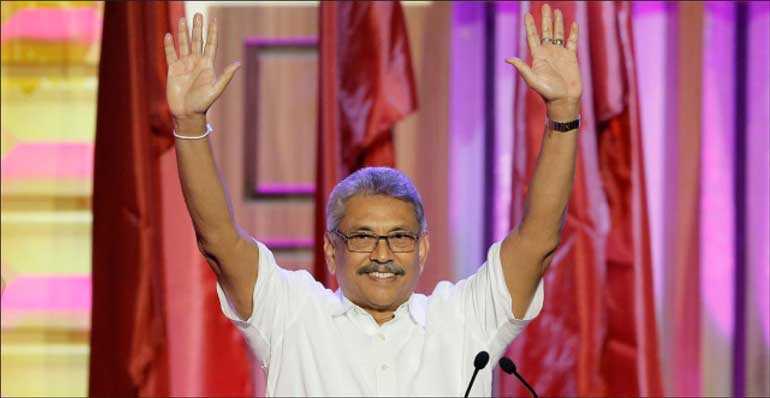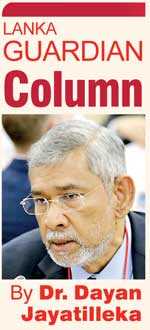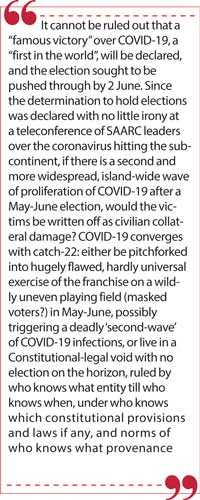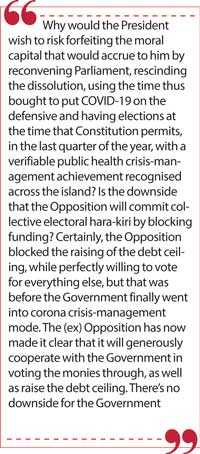Tuesday Feb 17, 2026
Tuesday Feb 17, 2026
Thursday, 16 April 2020 00:00 - - {{hitsCtrl.values.hits}}

The Cold War in politics and the institutional framework is not merely needless, it is one-sided and damaging to the anti-COVID 19 campaign. Two symptoms are the letter of reply under the signature of  the Secretary to the President Dr. P.B. Jayasundera, brusque and somewhat confrontational, to the Chairman, Commission of Elections, as well as the dismissal by the political leadership of the request to reconvene Parliament.
the Secretary to the President Dr. P.B. Jayasundera, brusque and somewhat confrontational, to the Chairman, Commission of Elections, as well as the dismissal by the political leadership of the request to reconvene Parliament.
The EC is faced with an unprecedentedly difficult decision which may not even be within its competence to make, and therefore suggests that the proper and prudent thing to do would be to seek the advice and guidance of the neutral umpire-cum-match referee, the Supreme Court. In any political system, when there arises an exceptional, extreme situation which constitutes a grey area regarding boundaries and spheres of influence of the three arms of the state, and requires a filigreed interpretation of the law and the Constitution, it is to the highest courts that the political system turns.
The EC’s request has met with a response describable as adversarial. There also appears to be a touchiness about the EC’s decision to postpone the election, though the President had himself said at the famous televised conference that preceded the address to the nation, that it had this power. It was indubitably clear both from his declaration at the teleconference with fellow SAARC leaders on precisely the COVID-19 crisis, as well as his televised address to the nation, that he much preferred to hold the snap election.
Of quite considerable concern too is the assertion in the letter “on the advice of the President” that it is not possible to say at this time that an election cannot be held by 28 May. That assertion by double-negation goes against the logic of the Government’s anti-COVID campaign, the testimony of medical experts and comparative international experience.
EC way or hard way?
It cannot be ruled out that a “famous victory” over COVID-19, a “first in the world”, will be declared, and the election sought to be pushed through by 2 June.
Since the determination to hold elections was declared with no little irony at a teleconference of SAARC leaders over the coronavirus hitting the subcontinent, if there is a second and more widespread, island-wide wave of proliferation of COVID-19 after a May-June election, would the victims be written off as civilian collateral damage?
COVID-19 converges with catch-22: either be pitchforked into hugely flawed, hardly universal exercise of the franchise on a wildly uneven playing field (masked voters?) in May-June, possibly triggering a deadly ‘second-wave’ of COVID-19 infections, or live in a Constitutional-legal void with no election on the horizon, ruled by who knows what entity till who knows when, under who knows which constitutional provisions and laws if any, and norms of who knows what provenance.
The biological free-fire zone Sri Lanka’s citizenry is being funnelled into is occasioned but not created by Nature; it will be a deliberate decision, man-made, utterly needless and easily avoidable. If the exits have been closed off, institutions boxed-in, a decision to hold a premature election during a pandemic may be forced through on pain of forfeiting that or any election indefinitely.
The pontification of (mostly expatriate) liberal legal scholars, that the President has only one real choice constitutionally, which is to scrap the election and reconvene Parliament, is typically irrelevant in that though it may be legalistically correct, it does not even pose the far more pertinent questions: what happens if he simply chooses to ignore it? What can be done, who will do it, and what political “concrete order” (Schmitt) will we live under if and when he has ignored this supposed ‘sole’ choice?
If the political leadership presents the country into a choice of a premature election which may trigger an exponential growth of the COVID-19 infection or being ruled outside the constitutional order and legal framework, future history will judge whether the most valuable of strategic real-estate, the moral high ground i.e. legitimacy, was lost by the regime.
Meanwhile it is shocking that the University Grants Commission (UGC) is to re-open universities in mid-May. The universities are zones where health and safety rules cannot be easily enforced and social distancing practiced. Lecture theatres and hostels are already overcrowded. The campuses will convert into coronavirus vectors. Sequestering the entire university student population may help intelligence-harvesting, but won’t prevent a Corona Chernobyl. Who will be accountable for the possible catastrophe?
Who’s afraid of Parliament?
The global practice is that it is precisely in a serious crisis, especially a public health crisis, that the political mode shifts from a zero-sum to a non-zero-sum game. Here in Sri Lanka by contrast, the example that is being set is of regarding not just one’s political rivals and competitors, but any institutional voice, well within the state system, that engages in demurral and questioning, as an enemy or threat. But as a threat to whom or what, and why so? There surely cannot be an assumption that there should be no constitutional, institutional or legal checks and balances, and that in a crisis, the powers of decision-making of the President should be absolute?
Why would the President wish to risk forfeiting the moral capital that would accrue to him by reconvening Parliament, rescinding the dissolution, using the time thus bought to put COVID-19 on the defensive and having elections at the time that Constitution permits, in the last quarter of the year, with a verifiable public health crisis-management achievement recognised across the island?
Is the downside that the Opposition will commit collective electoral hara-kiri by blocking funding? Certainly, the Opposition blocked the raising of the debt ceiling, while perfectly willing to vote for everything else, but that was before the Government finally went into corona crisis-management mode. The (ex) Opposition has now made it clear that it will generously cooperate with the Government in voting the monies through, as well as raise the debt ceiling. There’s no downside for the Government.
Is the problem that the Opposition will use the forum to criticise the Government’s handling of the crisis? If it does so unreasonably, it risks losing credibility with the electorate. If it makes valid points, it will help the Government by spotting the gaps and flaws that can be corrected. That is the way that legislatures function throughout the world.
In an article originally titled ‘Listening as Governance,’ significantly retitled by the Indian Express as ‘Overcoming a pandemic may look like fighting a war, but the real need is far from that,’ Nobel Prize winner for Economics and one of Asia’s and the world’s leading thinkers, Prof Amartya Sen argues forcefully that: “Tackling a social calamity is not like fighting a war which works best when a leader can use top-down power to order everyone to do what the leader wants — with no need for consultation. In contrast, what is needed for dealing with a social calamity is participatory governance and alert public discussion…Overcoming a pandemic may look like fighting a war, but the real need is far from that.” (Indian Express, 8 April)
‘Listening as governance’ cannot be substituted by ‘listening in’. Suspending or avoiding ‘participatory governance’-‘consultation’-‘discussion’ may reveal a newly emergent or latent doctrine among certain factions that this Presidency, plus the security/intelligence apparatuses, possess a panoptic capacity verging on omniscience, rendering Parliament redundant.
Sources of legitimacy
In his first address to the nation on Independence Day 4 February the President urged the Judiciary and officialdom not to impede his efforts and at a televised conference of officials and politicians, he reiterated that point through a rhetorical query: “What’s the use of a Constitution if I can’t fulfil my popular mandate?”
Every elected president receives such a mandate, and each mandate is different from the other. Constitutions are referred to as the basic law because they are more holistic, fundamental (i.e. larger) and of longer duration than such mandates. The same is true of the laws of war, unless of course one does not recognise any such laws. Countries such as the USA and France have a far more robust and rooted republican tradition—the tradition which places popular sovereignty at the centre—than does Sri Lanka, because they have a political culture sourced in emancipatory revolutions and their universalist ideals. Yet the value of a Constitution is never questioned vis-à-vis their most recent popular mandate. Prime Minister Modi who comes from a non-secular ideological culture, never questions the value of the secular Indian Constitution.
A popular mandate is periodic, short term. How can an electoral mandate be regarded as superior to the framework of the state, which has required a deliberative process of broader width and a greater popular mandate to promulgate than the simple majority obtained by any President or PM?
In the dominant discourse, ‘legitimacy’ is national not universal; it is self-referential, tautologous, deriving from a single normative parameter—‘patriotism’ (conflated with Sinhala Buddhist nationalism) generated by and resting upon a systemic combination of a patriotic (Sinhala-nationalist) President backed by a patriotic (Sinhala-nationalist) military and a patriotic (Sinhala-nationalist) clergy, constituting a new architecture which is in fact a throwback to an ancient one of the Sinhala monarchy backed (and often installed) by the clergy and supported by his army.
When a social or ideological-cultural stratum wishes to restore its archaic status and sees that within its grasp for the first time in centuries if not millennia, it reaches back into the mists of myth and strives to recreate a model of state which gives it that coveted role and status, proceeding to produce an ideology which legitimises the re-birth of that mythicised model. The archaic worldview aspires to do nothing less than replace the triple pillars of the modern state: legislature, executive and judiciary. An implicit, derivative assumption is that (ethno-religious) nationalism endows the President with an intrinsic superiority rending him more supreme than the Supreme Court.
In reality, legitimacy is moral-ethical and not cultural-civilisational; universal and international, not merely national (which is how and why Cuba wins 190 out of 193 votes at the UNGA in New York, against the USA), and national legitimacy itself derives from democratic legitimacy, not just from the support of the ethno-nationalist constituency. Contrary to the ultranationalist worldview, legitimacy is not exclusionary, hierarchical and hegemonistic.
The assumption that a President who won 52% of the vote enjoys sole national legitimacy while the 42% who voted for the Opposition presidential candidate possesses little majoritarian support and therefore little national legitimacy, is problematic.
A multiparty, pluralist Parliament containing Government and Opposition has as great a national bandwidth and ‘horizontal legitimacy’ as a monoethnic, partisan presidency has ‘vertical legitimacy’.
Totalitarian tendency
An elected executive sought to be reduced to a lame duck by the UNP is showing signs of aspiring to a role beyond primacy, to supremacy. The neoliberals deluded themselves as the neonationalists do, that they had made a revolution. What could have saved the former and what could save the latter, is the same thing: a vaccine cocktail of political realism, rationality and prudence.
Ultra-nationalism, racism, xenophobia and religious fundamentalism, in a word fanaticism, is conducive to and tends towards totalitarianism—far more of an existential danger than authoritarianism, neoliberal or otherwise.
The Lankan neoliberal regime tried to reshape the environment by imposition and manipulation, in a direction that went against the national grain. The ultranationalists are trying something deeper, more insidious. They are trying to remould, re-engineer, re-program according to their non-universal values norms and questionable ideas; impose a way of being, instead of regarding a way of being as something that cannot be prescribed but only described, evolving out of free choice and the free interaction of each with the other and the world. Unlike the neoliberals who were trying to sell us out, the ultranationalists are trying to own, possess and dominate; imprison our minds and brand our souls. The project is of ontological autocracy/serfdom-slavery, constricting our identity and chaining our sovereign choice of a way of being. It is The Matrix.
The human condition
The global production structure and process and the world market will have to look to China to keep it afloat and stimulate its recovery even more than it did in 2008, preventing the A Great Leap Backward of accelerated de-globalisation and the breakup of the world market/world economy, while modifying it and shifting the balance to Eurasia.
In the face of a global Great Depression, humanity will need, if it is to survive and recover, a new, New Deal, Rooseveltian-Keynesian, at national, regional/continental and global levels; a new humanist international order suffused by social democracy, universal welfarism and demand stimulation through a minimum wage.
That translates in Sri Lanka into a new, social democratic ‘Third Vector’ that is neither UNP neoliberalism nor Sirimavo-NM austerity and involuted ‘de-coupling’ from the world market and the world economy.
Confused ‘economic nationalists’ are exhibiting their long-standing conflation of neoliberalism with the open economy and globalisation. The current regime’s new economic doctrine throws out the baby of the open economy and globalisation with the bathwater of neoliberalism.
The successful fightback of China and the East Asian Tigers against COVID-19 was possible because of their advanced economies and societies, based upon the economic miracle of globalisation, though not neoliberalism. It is the dramatic opening up of the Chinese economy under Deng Xiaoping and the embrace of globalisation by his successors that generated the greatest and most rapid upliftment from poverty and creation of a prosperity in economic history.
Sri Lanka is turning its back on this evidence and reverting to ‘Voodoo economics’ (George Bush Sr) which failed worldwide including in this country, where Sirimavo-NM economic policies flipped a two-thirds majority into a one-term administration, a five-sixth majority for the Opposition and 17 years in political exile for the SLFP until CBK returned from self-exile and converted to the Open Economy.
The evidence of the successful (civilian-led) anti-coronavirus campaign in Jacinta Ardern’s New Zealand and our neighbouring Communist/left-run state of Kerala (MIT Technology Review, 13 April) proves the advantages of a social democratic model.
Cumulatively the evidence is that social democracy with/within a globalised open economic model, is qualitatively superior to neoliberal and neonationalist policy paradigms.
Whether humanity heads this way and how soon, will depend on politics. Which direction the politics of the post COVID-19 world and therefore contemporary history and the human condition will go, hinges on what happens in the USA this November. As in 1776 the American people’s choice will impact the Zeitgeist, determining whether predatory autocracies with their chronic deficiency of compassion, scientific reason, wisdom and humanism, will find their global curve flattened; whether we will experience a long global Winter of the human spirit, or as with the Spirit of ’76 which led to 1789 and 1848, a Springtime of Humanity.
[The writer’s doctoral thesis was entitled ‘The Moral Sierra Maestra: The Moral-Ethical Dimension of the Political Thought of Fidel Castro’.]